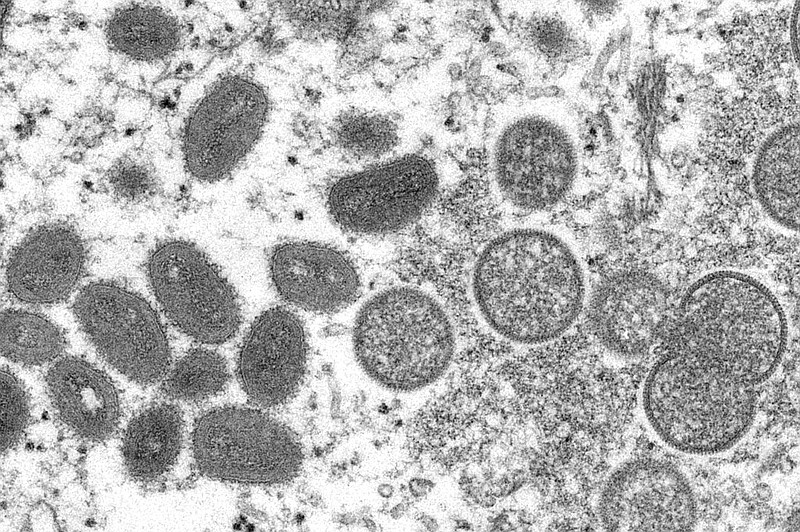Arkansas has had four confirmed cases of monkeypox, Dr. Jennifer Dillaha, director of the Arkansas Department of Health, said Thursday.
The state's first case of monkeypox was reported July 5.
Dillaha said Arkansas is probably among the least infected states at this time. The state Health Department said there are now 3,486 cases of monkeypox nationwide.
"We know with travel and the fact that this virus is a DNA virus, which means it's very stable, it can live in the environment, on clothing or sheets, so it's possible that we will see additional spread as a result of either that or just interactions, intimate skin-to-skin interactions," Dillaha said during a Zoom media briefing Thursday afternoon. "So we anticipate that we will see additional cases in Arkansas."
Also on Thursday, the Biden-Harris Administration announced the first phase of its national monkeypox vaccine strategy, which aims to rapidly deploy vaccines in the most affected communities and mitigate the spread of the disease.
"To date, [the Department of Health and Human Services] has received requests from 32 states and jurisdictions, deploying over 9,000 doses of vaccine and 300 courses of antiviral smallpox treatments," according to a statement from the White House. "With today's national monkeypox vaccine strategy, the United States is significantly expanding deployment of vaccines, allocating 296,000 doses over the coming weeks, 56,000 of which will be allocated immediately. Over the coming months a combined 1.6 million additional doses will become available."
According to the state Health Department, Arkansas has been allocated 600 doses of Jynneos, the monkeypox vaccine, and 10 courses of TPOXX, the antiviral medication used to treat monkeypox. One hundred doses of Jynneos have already arrived in Arkansas and the other 500 doses are scheduled to arrive today. The TPOXX arrived July 21.
Regarding TPOXX, Dillaha said, "We can get more right away. We just wanted to have some here so we could pre-position it so it's readily available if a case that's severe or risks being severe is identified."
"Most cases of monkeypox do not need to be treated," said Dillaha. "But someone who has a weakened immune system or people who have certain skin conditions like eczema are at increased risk of illness. And occasionally, someone will get the rash near an eye, for example. We would want to make sure those folks have the availability of treatment right away."
So far, the vaccine has been provided to Park West Pharmacy in Little Rock and will soon be sent to local health units in Craighead, Crittenden, Garland, Jefferson, Miller, Pope, Pulaski, St. Francis, Union and Washington counties. Those health units will serve as distribution hubs. Dillaha said some of those health units may have already received the vaccine.
Because of the limited supply, only certain people in Arkansas are eligible for the vaccine at this time.
"Those who are eligible for the vaccine include people who have had close contact with a known or suspected case in the last 14 days or those who have had a high-risk encounter in a setting or event where monkeypox has been reported to be spreading," according to a news release from the state Health Department. "Your health care provider will help decide if treatment is needed and prescribe it to you."
Dillaha said if a person takes the vaccine within four days of contact, it may prevent the development of the disease. And if they take the vaccine within 14 days of contact, "if it doesn't prevent the disease, it may make it a milder case."
Symptoms include fever, headache, muscle pain and a rash. Symptoms normally occur seven to 14 days after exposure. Typically, the rash starts one to three days after the other symptoms start, according to the state Health Department. However, the rash has been the initial symptom for some people, and the only symptom for others. The sores can look like pimples or blisters and may be painful or itchy.
Currently, the highest risk group for contracting monkeypox is mostly men who have sex with men, said Dillaha.
"I think it is just coincidental that it has entered into this social network first," she said.
"Men who have sex with men, they may wish to ... make other choices right now about their interactions with people and wait until we have a better handle on the spread of monkeypox," Dillaha said.
According to a news release from the state Health Department, "Monkeypox is spread through close contact and can be transmitted to anyone regardless of age, gender, sexual orientation, race and ethnicity. It can be spread by direct skin-to-skin contact with infectious rash, scabs, or body fluids."
The Centers for Disease Control has confirmed two pediatric cases in the U.S., as well as a small number of infections in pregnant women.
Monkeypox isn't an airborne illness like covid-19, said Dillaha.
"Monkeypox is not spread through casual, brief conversations or walking by someone with monkeypox, like at a grocery store," according to the Health Department.
Besides skin-to-skin contact and contact with contaminated items, Dillaha said, "There have been concerns that it could be spread by prolonged face-to-face contact, like kissing and so forth, but not by the respiratory route."
